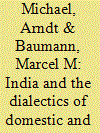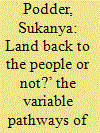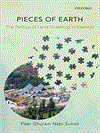|
|
|
Sort Order |
|
|
|
Items / Page
|
|
|
|
|
|
|
| Srl | Item |
| 1 |
ID:
124947


|
|
|
|
|
| Publication |
2013.
|
| Summary/Abstract |
Contemporary large-scale land deals are widely understood as involving the expulsion of people who, in turn, struggle instinctively to resist dispossession This is certainly true in many instances. Yet this chain of events evidently does not always occur: large-scale land deals do not always result in people losing the land, and many of those who face expulsion do not necessarily respond with the kind of resistance often expected of them. Indeed, much evidence shows that the nature of and responses to big land deals can (and do) vary across and within 'local communities'. Taking off analytically from a relatively narrow selection of cases, the expulsion-resistance scenario is too often assumed rather than demonstrated, thereby leaving many inconvenient facts undetected and unexplained. This suggests a need to step back and problematise the variable and uneven responses 'from below' to land grabbing, both within and between communities. This paper offers an initial exploration into why poor people affected by contemporary land deals (re)act the way they do, noting how issues and processes unite and divide them. This helps explain variation in political trajectories in the context of land grabbing today.
|
|
|
|
|
|
|
|
|
|
|
|
|
|
|
|
| 2 |
ID:
124936


|
|
|
|
|
| Publication |
2013.
|
| Summary/Abstract |
The contestation and appropriation of water is not new, but it has been highlighted by recent global debates on land grabbing. Water grabbing takes place in a field that is locally and globally plural-legal. Formal law has been fostering both land and water grabs but formal water and land management have been separated from each other-an institutional void that makes encroachment even easier. Ambiguous processes of global water and land governance have increased local-level uncertainties and complexities that powerful players can navigate, making them into mechanisms of exclusion of poor and marginalised people. As in formal land management corporate influence has grown. For less powerful players resolving ambiguities in conflicting regulatory frameworks may require tipping the balance towards the most congenial. Yet, compared with land governance, global water governance is less contested from an equity and water justice perspective, even though land is fixed, while water is fluid and part of the hydrological cycle; therefore water grabbing potentially affects greater numbers of diverse water users. Water grabbing can be a powerful entry point for the contestation needed to build counterweights to the neoliberal, corporate business-led convergence in global resource governance discourses and processes. Elaborating a human right to water in response to water grabbing is urgently needed.
|
|
|
|
|
|
|
|
|
|
|
|
|
|
|
|
| 3 |
ID:
143937


|
|
|
|
|
| Summary/Abstract |
International land “acquisition” or land “grabbing” has become a global phenomenon in which India plays an increasingly important role. While there is a critical domestic debate regarding land deals within India — especially pertaining to the provisions of the Land Acquisition Act of 2014 — there is practically no such debate regarding international land deals by Indian companies in Sub-Saharan Africa. By applying a two-level discourse analysis, this article argues that the land discourse within India can be understood as a strategy of exclusion. By linking land issues with questions of “development,” the discursive strategies of powerful actors lead to the exclusion of the arguments of NGOs and others opposed to the land deals from the discourse within India. This strategy of exclusion is then taken to the extreme with the strategy of securitization outside India: land deals are linked to “food security,” as the example of Ethiopia highlights.
|
|
|
|
|
|
|
|
|
|
|
|
|
|
|
|
| 4 |
ID:
139445


|
|
|
|
|
| Summary/Abstract |
Despite the increasing acknowledgment of scholars and practitioners that many large-scale agricultural land acquisitions in developing countries fail or never materialize, empirical evidence about how and why they fail to date is still scarce. Too often, land deals are portrayed as straightforward investments and their success is taken for granted. Looking at the coffee sector in Laos, the authors of this article explore dimensions of the land grab debate that have not yet been sufficiently examined. Coffee concessionaires in southern Laos often fail to use all of the land granted them and fail to produce high yields on the land they do use. Thus, the authors challenge the often-assumed superiority and effectiveness of large-scale versus small-scale production, specifically the argument that they modernize agricultural production and optimize land use. They argue that examining failed investments is as important as studying successful ones for understanding the implications of the land grabbing phenomenon for social, economic, and environmental outcomes. Knowledge about the scale of “failed land deals” provides important motivation for national governments to close the gap between intentions and actual outcomes. This article engages with the current debate on quality of investment and challenges the approach of employing land concessions as a vehicle for economic development in the Lao coffee sector and in other sectors and countries.
|
|
|
|
|
|
|
|
|
|
|
|
|
|
|
|
| 5 |
ID:
191861


|
|
|
|
|
| Summary/Abstract |
Drawing on empirical research from Pujehun and Port Loko districts in Sierra Leone, this article explains the variable pathways of civic activism mobilised by environmental advocacy, and legal empowerment organisations, in response to two prominent land grabs. By grounding the analysis within the ontology of place, this study examines the dynamic interplay between national politics, global corporate interests, transnational advocacy, and civic agency in each place. The article finds that although the balance of power between these actors matters, the nature of corporate interests involved can be significant in determining the exact trajectory of civic mobilisation, and ultimately its success.
|
|
|
|
|
|
|
|
|
|
|
|
|
|
|
|
| 6 |
ID:
138986


|
|
|
|
|
| Summary/Abstract |
The literature on the “new global land grab” has to date been preoccupied with macro and theoretical studies, resulting in a lack of in-depth local studies. This article uses a Liberian case study and quasi-anthropological methods to address this imbalance. In Liberia, historical confrontations over resource access that are tied to issues of land ownership have been given new life by the interjection of a Malaysian palm oil corporation. Elders, as the biggest potential losers in the confiscation of land, have successfully linked themselves to NGOs and transnational advocacy campaigns that publicize land grabbing and pressure for international standards and compliance. At the same time, young men who largely came of age during the civil war have been rendered invisible and palpably frustrated. In exploring the generational divide that has characterized the Sime Darby plantation, this article not only reveals that land grabbing has its supporters as well as its detractors, but also unmasks the role that NGO advocacy networks play in local politics and in shaping the narratives that the wider world hears about the response of African communities to new development trends.
|
|
|
|
|
|
|
|
|
|
|
|
|
|
|
|
| 7 |
ID:
124919


|
|
|
|
|
| Publication |
2013.
|
| Summary/Abstract |
This article examines the contemporary phenomenon of 'land grabbing' in relation to the history of plantation and large- and small-scale farming (PF, LSF and SSF) in sub-Saharan Africa. It looks at the extent of PF and LSF over the 20th century, as well as the policy narratives that have justified, supported or circumscribed their development. Many characteristics of the current land rush and its interpretation reveal elements of continuity with some of the general trends marking the history of PF and LSF up to recent years. In particular, the heterogeneity of PF and LSF, subsuming quite different relations to SSF, and the pivotal role played by the combination of private capital (whether foreign, domestic or combined) with the state represent organisational continuities. Meanwhile continuities in supporting narratives centre on the prevalence of generic prescriptions for either LSF/PF or SSF. Refuting these generic prescriptions is a precondition for more nuanced analysis and policy proposals.
|
|
|
|
|
|
|
|
|
|
|
|
|
|
|
|
| 8 |
ID:
156800


|
|
|
|
|
| Publication |
New Delhi, Oxford University Press, 2018.
|
| Description |
xv, 194p.: tables, maps, figureshbk
|
| Standard Number |
9780199477616
|
|
|
|
|
|
|
|
|
|
|
|
Copies: C:1/I:0,R:0,Q:0
Circulation
| Accession# | Call# | Current Location | Status | Policy | Location |
| 059256 | 352.54/SUH 059256 | Main | On Shelf | General | |
|
|
|
|
| 9 |
ID:
163701


|
|
|
|
|
| Summary/Abstract |
China tends to be a dominant figure in the literature on global land grabbing. It is either cast as a major land grabber in distant places such as Africa, or as a key player in crop booms elsewhere because it provides for massive market demand, such as for soya from South America. These are all important issues and are well covered in the literature. However, the crop booms inside China that involve transnational capital and investors – and have provoked conflict around land politics – have been overlooked. Spotlighting the issue of land grabbing inside China reminds us that capital accumulation is principally interested in geographies and settings where it can generate profit – regardless of nationalities, boundaries, structural or institutional conditions. This paper hopes to contribute towards a more refined picture of global land grabbing.
|
|
|
|
|
|
|
|
|
|
|
|
|
|
|
|
|
|
|
|
|